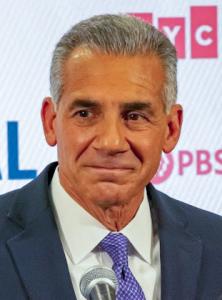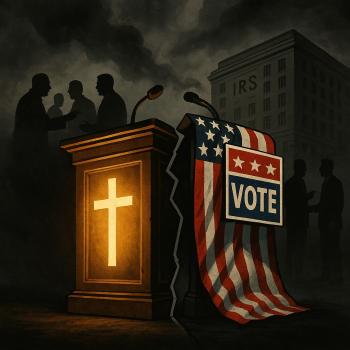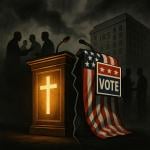With New Jersey’s popular Governor Phil Murphy stepping aside, the race to lead the Garden State has taken center stage—and with it, the intersection of faith and politics.
After a crowded primary season featuring 11 candidates, voters have now narrowed the field to two: Democratic U.S. Representative Mikie Sherrill and Republican former State Assemblyman Jack Ciattarelli. Both candidates won decisive victories in their respective primaries, but as the general election heats up to an eventual showshown in November, so too does the role of religion in their public lives and political identities. In a state where two-thirds of residents identify as Christian—half of whom are Catholic— could faith become one of the election’s most influential forces?
As part of the Patheos forum on “Faith and Politics,” we offered a breakdown of the race.
In the article, we covered each candidate and also explored their stance on faith, religion and spirituality. As with any state election process, not every candidate stands on a public foundation of dogma.

Sherrill won on a platform that had many looking to her as “the most electable candidate.” The wife and mother of four is also a former U.S. Navy pilot who shared her “commonplace” vantage point to win over denizens of New Jersey and earn their trust. Sherrill received over 268,000 votes or 34% of the state’s Democratic Party vote. Her closest competitor was Newark Mayor Ras Baraka, who earned just over 20% of the primary vote.
In terms of faith, Sherrill is a devout Catholic and was seen attending Mass during her time serving both New Jersey and Washington, D.C. Her zeal to give back is inspired by her admiration for the Jesuits, who adhere to a more orthodox view of Sacraments, service, training, and mission within the Catholic Church.
Despite a conservative stance in her faith, her politics brush up against the alt-right and ultra-conservative base supporting President Trump.
“It’s going to take a strong voice to cut through the noise from Washington and deliver for the people. So I stand here tonight doing just that. And as a mom of four teenagers, you guys know I’m not going to put up with the incompetent, whiny nonsense coming from aggrieved MAGA Republicans,” Sherrill told her supporters Tuesday at a victory rally.
In a more overwhelming and impressive fashion, former state Alderman Jack Ciattarelli won by 67.8% of the New Jersey Republican primary vote (309,508 votes). Bill Spadea, a conservative national talk show host, only earned 21% in a runner-up bid for the vote.

Ciattarelli benefitted greatly from President Trump’s endorsement. Earlier in his career, he faced former Gov. Murphy in 2021 on his platform of school reform. The cause is dear to New Jersey, a state that ranks number one in education, from grades K through 12. Although higher education ranks #36 nationwide, Ciattarelli focused on the next generation and families in hopes of support.
His core religious beliefs are not something widely shared with the public. While contributing to the status quo in New Jersey as a conservative Catholic, Ciattarelli stood up against a popular Hudson County pastor in 2021 for not living a pious life. His faith isn’t a visible thing in comments or public church attendance, but his walk and actions tend to spotlight a moral, ethical, and scriptural lens.
For this primary, that same stance worked and created a formidable opposition for Rep. Sherrill. She has directly tied Ciattarelli with MAGA barbs, which are welcomed by the Republican candidate. He leans on affordability, public safety and education, three foundational elements to the GOP.
Together, the two candidates should be able to contend heavily for each other’s vantage points, hoping to reach some of the New Jersey independent voters. While the political notes and economic ties will reflect much of their work, in this state, they need to still lean on the church for support.
Pew Research notes 67% of the state’s adults identify themselves as Christian, almost half of those say they are Catholic (34%). The undercurrent of that demographic is a 13% Evangelical Protestant population who want to hear from each candidate. In due time, based on their numbers, they will.














